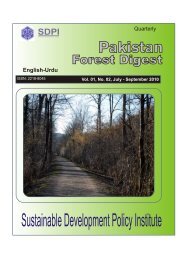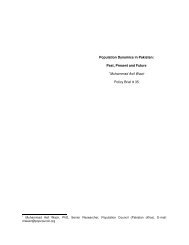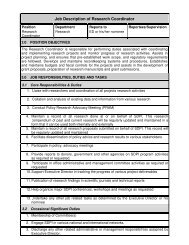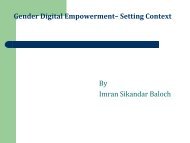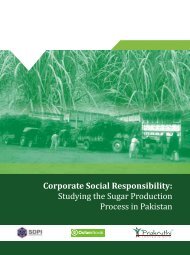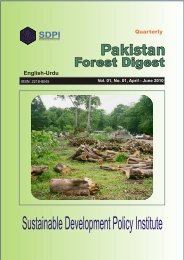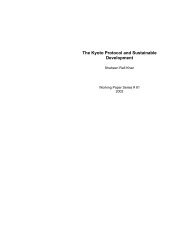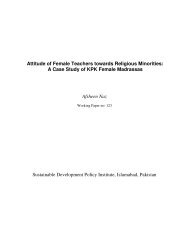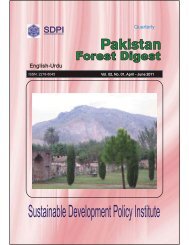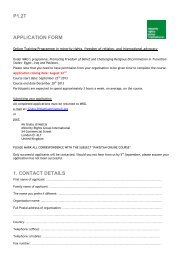Annual Report 2009-10 - Sustainable Development Policy Institute
Annual Report 2009-10 - Sustainable Development Policy Institute
Annual Report 2009-10 - Sustainable Development Policy Institute
- No tags were found...
You also want an ePaper? Increase the reach of your titles
YUMPU automatically turns print PDFs into web optimized ePapers that Google loves.
<strong>Annual</strong> <strong>Report</strong><strong>2009</strong> - 20<strong>10</strong>Water and SanitationSDPI's work on food security does not only stop at identifying most insecure districts of Pakistan,but it also strives to improve the food security situation through its research based policyrecommendations on improving both socio-economic access to food (see Livelihood Security &Economic Sustainability sections for detail) as well as food absorption. The following projectsreflect SDPI's work on improved access to clean drinking water.Access to Improved Drinking Water in City Slums with Household Water Treatment Systems(HWTS) Nadi Water FilterUnclean water contaminated chemically or microbiologically is a health hazard. Many deaths(mostly of children under the ages of five) are caused annually by water-borne diseases such asCholera, Typhoid fever, Diarrhoea, Dysentery, Hepatitis A and other diarrhoeal diseases Accordingto WHO reports 80% of all infections are traceable to poor quality of drinking water. Theestimated cost to Pakistan's economy due to diarrhoeal disease is estimated at Rs.55-80 billion/yr.Household-level interventions for water treatment must be given priority, as this will contribute tothe safety component, which in turn is expected to significantly contribute to achieving the Millennium<strong>Development</strong> Goals and food security. Adequate accessible methods for household watertreatment at point of use (POU) and safe storage (HWTS), combined with hygiene promotioncould prevent the population suffering from (without access to safe drinking water) from illnessand often resulting in death. The easy self-help Nadi Dinking Water Filter, a bio-filter type, isunique in its simple design, assembly and cost. The filter consists of baked clay Nadi & Mataka,sand & gravel of different mesh sizes and a rubber or plastic tube. The effectiveness of the Nadifilter unit is evident from the color, taste & transparency of the water filtered through it, as well asthe laboratory reports of bacteriological examination of the filtered water samples.In an earlier completed project, conducted by the Association for Humanitarian <strong>Development</strong>(AHD) in collaboration with <strong>Sustainable</strong> <strong>Development</strong> <strong>Policy</strong> <strong>Institute</strong> (SDPI), over <strong>10</strong>00 NWFunits were installed and are operating in 20 villages of Taluka Jati area in District Thatta, Sindh,Pakistan. A noticeable decrease in diseases has been reported by Nadi water filter users(specially infants/children's) visits to doctors/hospital.The present work in the city slums is carried out by SDPI, in collaboration with AHD and withfinancial support from UNEP National Committee for the Republic of Korea (UNEP NATCOMROC) and is an extension of the above referred earlier work Slums of Islamabad, Rawalpindiand Hyderabad cities are selected for the present work. These areas not only have problems ofshortage of water but available water is also considered unsafe for drinking.On conducting the survey of the slums, it was established that most of the diseases in the area22S u s t a I n a b l e D e v e l o p m e n t P o l I c y I n s t I t u t e



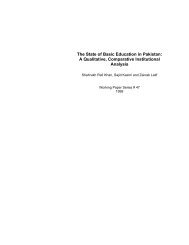
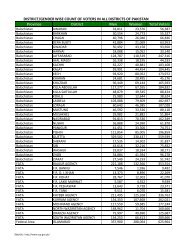
![(October - December, 2010) [13th SDC Special Bulletin]](https://img.yumpu.com/50118608/1/184x260/october-december-2010-13th-sdc-special-bulletin.jpg?quality=85)
